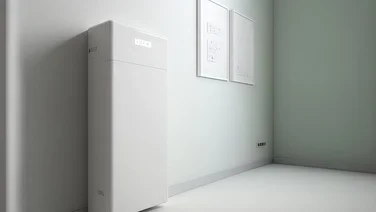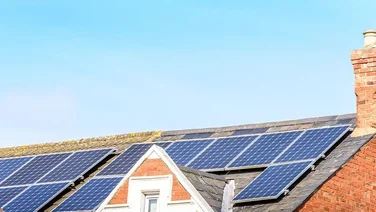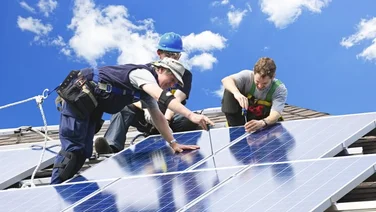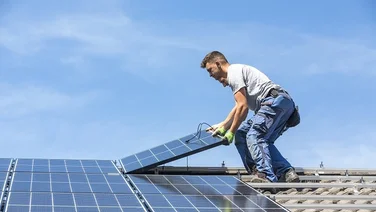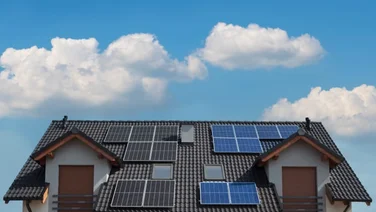We receive a small fee from trusted installers when you request a quote through our site. This helps us keep our content independent, well-researched and up to date – Learn more
- What’s on this page?
- The best angle for a solar panel system
- The best direction for a solar panel system
- The impact of angle and direction on solar panel output
- Can you install north-facing solar panels?
- Does the best angle for solar panels change throughout the year?
- Can you put solar panels on a wall?
- Can you put solar panels on a flat roof?
- Summary
- The optimal angle for solar panels in the UK is between 20° and 50°
- UK-based solar panels generate most energy when facing south
- Solar panel orientation depends on where in the world you’re located
Solar panels can shrink your carbon footprint and your energy bills, and with the most efficient solar panels you’ll break even in 14 years time.
This would be reason enough to consider them, and that’s before you consider that the cost of solar panels has decreased massively over the past decade.
But before you get started on the buying process, you’ll need to work out whether your roof is actually suitable for them. And we’re not just talking about its ability to hold the panels’ weight.
If you want your solar panels to work to their best potential, you’ll need to make sure they’re propped up at the perfect angle, and facing in the right direction. Solar trackers can help with this on ground or flat roof installations – otherwise we’re here to show you how.
Once you’ve got this figured out, it’s time to buy the perfect set of solar panels for your home – luckily, we can help you with that too.
All you have to do is pop a few details in this short form. Once we’ve received your response, we’ll pass it on to our suppliers, who’ll be in touch with free, bespoke solar panel quotes.
Where do you want to install solar panels?
Get started
What’s on this page?
The best angle for a solar panel system
The best angle for a solar panel system in the UK is between 20° and 50°.
At this kind of angle, your solar panels will be exposed to more sunlight, which will lead to more energy production and larger savings.
If you want to install solar panels on a flat roof, you can still achieve the optimal angle by propping them onto a mounting system.
Bear in mind that the best angle for a solar panel system will be different in other parts of the world, as it’s based on the latitude of your location.
Check out the table below to get a better idea of how much location affects the angle.
| Country | Best angle | Best direction |
|---|---|---|
London, UK | 35° | South |
Abuja, Nigeria | 10° | South |
Madrid, Spain | 30° | South |
Mexico City, Mexico | 20° | South |
Cape Town, South Africa | 30° | North |
Why is it important to angle your solar panel?
Having solar panels at the optimal angle can:
- Increase the amount of sunlight available to the panels during the mornings and evenings
- Make the panels more effective
- Lead to more savings on energy bills
- Act as a self-cleaning method, as the rain will wash off any debris
Where do you want to install solar panels?
Get startedThe best direction for a solar panel system
To make sure the solar panels are pointing towards the sun for the majority of the day, UK solar panel owners should have their panels facing southwards.
Again, this rule changes from country to country – it all depends on which hemisphere they’re located in. So whilst UK solar panels (located in the Northern Hemisphere) need to face south, panels in Australia (located in the Southern Hemisphere) need to face north.
Having your solar panels facing south is even more important when you’re placing them on a wall, since wall-mounted solar panels receive less sunlight on average. You can find out more about them in our helpful guide.
You can read more about north vs south facing solar panels on our page.

The impact of angle and direction on solar panel output
Technically, you can face your solar panels in any direction – they’ll still generate some electricity.
But the further you face your panels away from their optimate direction, the less energy they’ll generate.
The table below outlines how much the angle and orientation of the solar panel impacts its effectiveness, with 100% indicating the maximum output.

69% of people said would buy or rent a property with solar panels on it, according to our National Home Energy Survey, up from 65% last year.
Can you install north-facing solar panels?
Yes, you can install north-facing solar panels in the UK – but it might not be very effective.
As we outline in the table above, installing panels on a roof that isn’t south-facing can lead to losses in solar output.
To overcome this issue, you can install panels on a north-facing roof with a mounting system that’s pitched against the slope of the roof. We won’t beat around the bush – this won’t look very aesthetically pleasing, but it’ll usually double your savings.
Does the best angle for solar panels change throughout the year?
The Earth has a tilted axis, which means the sun’s perceived distance from the horizon changes throughout the year. This means that the optimal angle for solar panels changes throughout the year – it’s never fixed.
To make sure your solar panels reach their maximum output, some experts in the field suggest altering their angle throughout the year.
Of course, it’s not the end of the world if you can’t adjust your solar panels (for instance because they’re fixed to your roof), but bear in mind that some research suggests adjusting your panels four to five times throughout the year can lead to increased generation.
The exact intervals and angles of the adjustments depend on the panels’ geographic location.
Can you put solar panels on a wall?
Yes, you can put solar panels on a wall – either mounted parallel to it or tilted away.
Again, having panels tilted at the optimum angle will mean your panels can absorb more sunlight, which will lead to more savings. Having them on a south-facing wall is also a must.
You’ll also want to make sure that the panels on the wall won’t be obstructed by any shade.
Wall-mounted solar panels tend to be more difficult to install than roof-mounted ones, but they’re usually easier to maintain than roof-mounted or ground-mounted panels. This is because debris, snow, and other obstructions are unable to pile up, thanks to good old gravity.
Can you put solar panels on a flat roof?
Although solar panels are more commonly found on sloped roofs, they’re also suitable for flat roofs.
To make sure your panels can absorb as much sunlight as possible, they should be installed on a framing system, which will tilt your panels at the optimal angle. This will help them self-clean in the rain, avoid damage from pooling water, and generate more solar energy.
Technically, you can lay the panels down on a flat roof – just as you would on a pitched roof – but this will restrict them from absorbing as much sun as possible, and they may require more maintenance.
Want to find out more about installing solar panels on a flat roof? Check out our page Can You Put Solar Panels on a Flat Roof?
Can I install solar panels on the ground?
Absolutely, as long as you have enough space you can buy and make the most of ground-mounted solar panels and bifacial panels.
There are loads of benefits to ground-mounted solar panels, the biggest one being that they can generate as much as 35% more energy than roof-mounted solar panels, as achieving the best angle and direction is easier when no roof is in the way.
Bifacial solar panels allow you to generate energy on both sides, which means more energy and money saved.
Summary
There you have it – everything you need to know about the best angle and direction to have your solar panels.
Now that you know how to get the most out of solar panels, it’s time to crack on with the buying process.
Want to speed this part up? We’ve got you covered.
Simply pop your details in this short form and we’ll put you in touch with our local suppliers, who’ll provide you with free, bespoke solar panel quotes.



